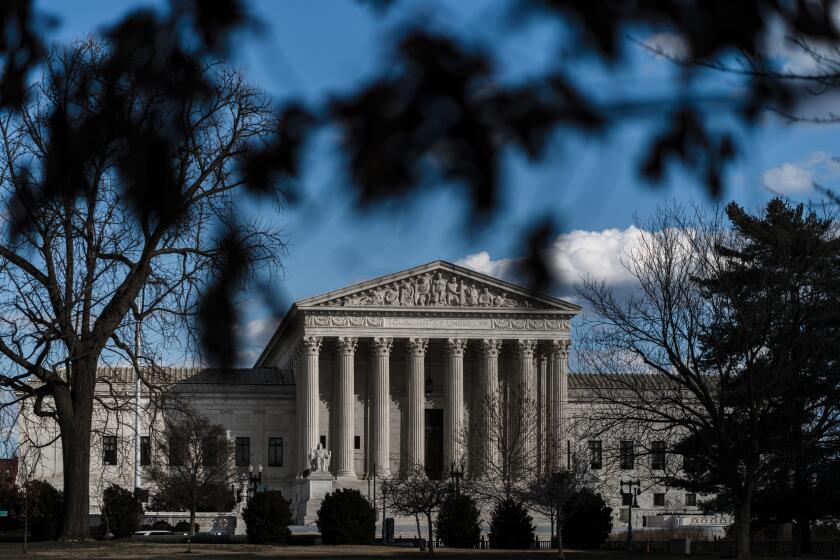Supreme Court rules Biden can end Trump’s ‘Remain in Mexico’ policy

The Supreme Court upholds Biden’s broad power to repeal the Trump-era ‘Remain in Mexico’ policy.
WASHINGTON — The Supreme Court on Thursday upheld President Biden’s power to enforce immigration laws, ruling he may repeal the Trump-era “Remain in Mexico” policy, which barred most Central American migrants from entering the United States to seek asylum.
The 5-4 decision in Biden vs. Texas reversed lower court rulings that held the Democratic administration must continue President Trump’s strict border enforcement policy.
Chief Justice John G. Roberts Jr. wrote the majority opinion, joined by fellow conservative Justice Brett M. Kavanaugh and the court’s three liberals, Justices Stephen G. Breyer, Sonia Sotomayor and Elena Kagan.
Roberts said the law allowed the administration to return asylum seekers to Mexico but did not require it to do so.
His opinion is not a sweeping victory for the administration, but the chief justice said the law did not require Biden to adopt Trump’s view of the law.
“We merely hold that [the Immigration and National Act] means what it says: ‘may’ means ‘may,’ and the INA itself does not require the secretary to continue exercising his discretionary authority under these circumstances,” he wrote.
The justices returned the case to a lower court in Texas to consider other remaining objections to Biden’s policy.
Immigrant rights activists hailed the outcome as a major victory and a welcome surprise.
“This is a victory for the thousands who were left stranded by Trump’s Remain in Mexico policy,” said Erin Mazursky, managing director of Families Belong Together. It “comes in the same week that we are mourning the lives lost in San Antonio — a devastating tragedy directly tied to policies like Remain in Mexico that have obstructed a safe and fair asylum system.”
She was referring to the more than 50 migrants who died after having been abandoned inside a truck trailer in the Texas heat.
“Now, the Biden administration must put an end to this cruel policy and move forward with its promise of a more compassionate approach to a system that welcomes people seeking safety,” she said.
But ACLU attorney Lee Gelernt cautioned the policy at the border may not change as long as Title 42 is in place. That pandemic-related rule has blocked migrants from entering to apply for asylum, and it is unchanged by Thursday’s ruling.
“There are overlapping policies, and Title 42 is more extreme and affects more people than MPP,” he said, referring to the Migrant Protection Protocols, the official name of the Trump-era policy. “So as a practical matter, it doesn’t matter much if MPP can be used if Title 42 is in effect,” he said.
A federal judge in Louisiana blocked repeal of Title 42, and the litigation to challenge that ruling is moving slowly, Gelernt said.
Some immigrants-rights advocates contend the administration does not want to make a major change in the border policy before the November elections.
Trump announced his policy in December 2018. Migrants from Central America were told they could no longer enter the United States at a border crossing, apply for asylum and seek their release while their claims were pending, a process that can stretch over several years.
Ruling in favor of coal-producing states, Supreme Court says Congress, not the EPA, has the authority to make decisions on fighting climate change.
Instead, they were told they must wait in Mexico until their claims were set to be heard before an immigration judge.
Immigrant rights advocates condemned the Trump policy as unsafe and inhumane. Biden signaled his intent to repeal it in his first days in office.
But the new administration ran into a strong legal challenge from Republican state attorneys general in Texas and Missouri. They filed suits arguing that Biden’s repeal of Trump’s policy violated the law and procedural rules. And they won rulings from Trump-appointed judges that blocked the repeal.
Last year, the Supreme Court turned away the administration’s pleas and refused to intervene. But the justices agreed to hear full arguments in April.
The Supreme Court will hear a case about Republican lawmakers wanting to draw partisan election maps without interference from state high courts.
At issue were conflicting provisions in immigration laws. Lawyers for Texas pointed out that one says most asylum seekers “shall be detained” until their cases are heard, or the government “may return” them to the territory where they entered.
Biden’s lawyers pointed to other provisions that say asylum seekers may be released on parole in “a case-by-case” for urgent or humanitarian reasons. They also argued it has been understood for decades that the immigration authorities did not have nearly enough detention facilities to hold all the migrants who had pending asylum claims.
Last week, Kavanaugh joined the more conservative justices in the major rulings on abortion, guns and religion. But on Thursday, he agreed with Roberts that the president, whether a Republican or Democrat, has leeway on how to enforce immigration laws.
The long-standing problem, he said, is that the government does not have enough space to hold many tens of thousands of asylum-seekers until their cases can be heard.
“When the Department of Homeland Security lacks sufficient capacity to detain noncitizens at the southern border pending their immigration proceedings (often asylum proceedings), ... the immigration laws afford two primary options,” he said. “Option one: DHS may grant noncitizens parole into the United States. ... Notably, every administration beginning in the late 1990s has relied heavily on the parole option, including the administrations of Presidents Clinton, Bush, Obama, Trump, and Biden.”
More to Read
Get the L.A. Times Politics newsletter
Deeply reported insights into legislation, politics and policy from Sacramento, Washington and beyond. In your inbox three times per week.
You may occasionally receive promotional content from the Los Angeles Times.













